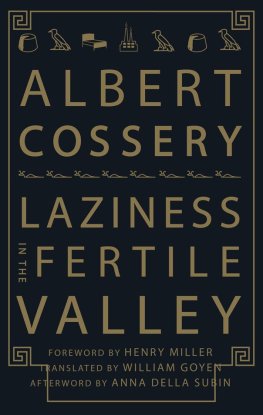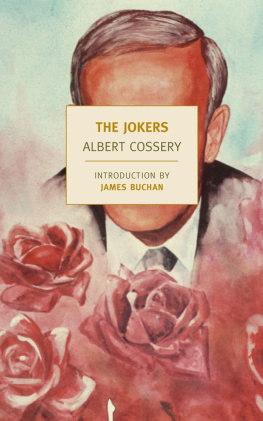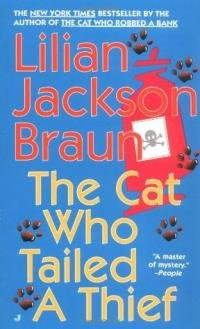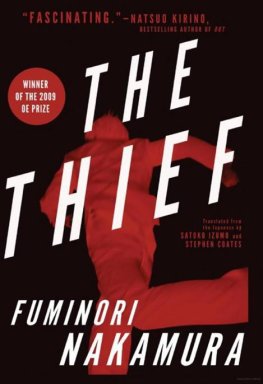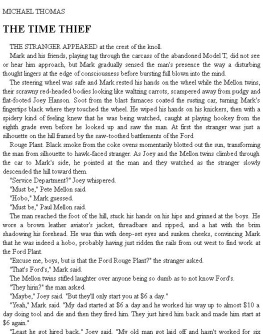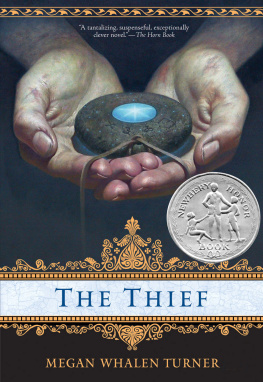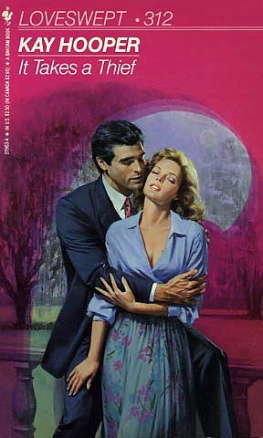Albert Cossery
The Colors
of Infamy
Translated from the French by Alyson Waters
A New Directions Book
Also by Albert Cossery
Available from New Directions
A Splendid Conspiracy
Copyright 2000 by Albert Cossery
Translation copyright 2011 by Alyson Waters
Originally published by EditionsGallimard / Editions Joelle Losfeld, Paris, France, in 1999, as Les couleursde linfamie. Published by arrangement with Editions Gallimard,Editions Joelle Losfeld, Agence Hoffman, Paris, and The Colchie Agency.
All rights reserved. Except for briefpassages quoted in a newspaper, magazine, radio, television, or website review,no part of this book may be reproduced in any form or by any means, electronic,or mechanical, including photocopying and recording, or by any informationstorage or retrieval system, without permission in writing from thePublisher.
New Directions gratefully acknowledgesthe support of a Hemingway Grant and a CNL Award. Cet ouvrage, publi dans lecadre dun programme daide la publication, bnficie du soutien duMinistre des Affaires trangres et du Service Culturel de lAmbassade deFrance aux tats-Unis. This work, published as part of a program ofaid for production, received support from the French Ministry of Foreign Affairsand the Cultural Services of the French Embassy in the United States.
This work is published with support fromthe French Ministry of Culture / Centre national dulivre.
Translators Note : Thanks to Donald Nicholson-Smith, GwenalKerlidou, and Emmanuelle Ertel for input and insight.
Published simultaneously in Canada byPenguin Books Canada, Ltd.
First published as a New Directions Paperbook(NDP1215) in 2011.
Design by Erik Rieselbach
Library of Congress Cataloging-in-Publication Data
Cossery, Albert, 19132008.
[Couleurs de linfamie. English]
The colors of infamy / Albert Cossery ;translated from the French by Alyson Waters.
p. cm. (New Directions paperbook ;1215)
eISBN 978-0-8112-2125-2
I. Waters, Alyson, 1955 II. Title.
PQ2605.O725C6413 2011
843'.912dc23 2011023265
10 9 8 7 6 5 4 3 2 1
New Directions Books are published forJames Laughlin
by New Directions Publishing Corporation
80 EighthAvenue, New York, NY 10011
I
T he humanmultitude meandering at the nonchalant pace of summer along the ancient city ofAl Qahiras torn-up sidewalks seemed to be dealing serenely, even somewhatcynically, with the steady, irreversible decay of their surroundings. It was asif all these people, stoically strolling beneath the molten suns incandescentavalanche, were, in their tireless wanderings, benignly colluding with someinvisible enemy eating away at the foundations of the erstwhile resplendentcapital. Immune to drama and devastation, this crowd swept along a remarkablevariety of characters lulled by their idleness: workmen without jobs;intellectuals disillusioned with fame; civil servants forced from their officesfor want of chairs; craftsmen without customers; university graduates saggingbeneath the weight of their futile knowledge; and finally those inveteratescoffers philosophers in love with their tranquility and shade, who believedthat the citys spectacular deterioration had been expressly created to honetheir critical faculties. Hordes of migrants had come from every province withpreposterous illusions about that hive of activity, the prosperous capital, andthey had latched on to the local population, forming an appallingly picturesquepack of urban nomads. In this riotous atmosphere, cars sped by, heedless oftraffic lights, like machines without drivers, transforming any vague notion apedestrian might harbor of crossing the street into an act of suicide. Along theneglected thoroughfares stood apartment buildings doomed to imminent collapse(the landlords had long banished from their minds any pride of ownership) andfrom balconies and terraces converted into makeshift lodgings flew the multihuedrags of destitution like flags of victory. Th esedilapidated dwellings brought to mind an image of future tombs and gave theimpression, in this country awash with tourist attractions, that all thesepending ruins had over time come to be prized as antiques and were therefore notto be touched. In some places water from burst sewer pipes caused pools as wideas rivers to form, wafting the effluvia of unspeakable stenches and pullulatingwith flies. Naked and unashamed, children entertained themselves by splashingabout in this putrid water, sole antidote to the heat. As if it were a day ofrevolution, the streetcars overflowed with clusters of people and dug out at asnails pace a pathway along the rails obstructed by the pressing mass of apopulace that had long ago gained expertise in survival strategies. Resolutelycircumventing every obstacle, every pitfall in their path, the people,discouraged by nothing and with no particular goal in mind, continued theirjourneys through the twists and turns of a city plagued by decrepitude, amidscreeching horns, dust, potholes and waste, without showing the least sign ofhostility or protest; the awareness of simply being alive seemed to obliterateany other thought. Every now and then the voices of the muezzins at the mosqueentrances could be heard emanating from loudspeakers, like a murmuring from thebeyond.
M ore thananything, Ossama enjoyed contemplating the chaos. As he leaned his elbows on therailing of the elevated walkway on its metallic pillars that encircled TahrirSquare, he was contemplating ideas that flew in the face of all the theoriespropounded by those certified experts who swore that a countrys continuedexistence was predicated on order. This absurd notion was utterly belied by thespectacle that spread before his eyes. For some time now, he had been treatingthis structure, dreamed up by humanist engineers to shield the miserablepedestrians from the streets dangers, as a panoramic observation deck toreinforce his profound conviction that the world could go on living in disorderand anarchy indefinitely. And indeed, despite the elaborate free-for-all thatdominated the huge square, nothing seemed to alter the populations mood or itsspirited gift for sarcasm. Ossama was convinced that there was nothing morechaotic than war; yet wars lasted for years on end and it even happened thatgenerals notorious for their ignorance won battles because shock, by its verynature, is a great producer of miracles. He was thrilled to live among a race ofmen whose exuberance and loquaciousness could not be spoiled by any iniquitousfate. Rather than fulminating against the problems they faced because of theircitys outrageous decrepitude, they behaved affably and civilly, as if theyattached no importance whatsoever to those material inconveniences that couldlead to suffering in petty souls. This dignified, noble attitude filled Ossamawith wonder, for to him it was a sign of his compatriots complete inability tofathom tragedy.
Ossama was a young man, about twenty-three years old, who althoughnot strikingly handsome, nonetheless had the face of a charmer; his dark eyesshone with a glimmer of perpetual amusement, as if everything he saw and heardaround him were inevitably comic. He wore with incomparable ease a beige linensuit, a raw silk shirt set off by a bright red tie, and brown suede shoes. Thisoutfit, quite ill-suited to the scorching heat, was not the result of personalwealth, nor was it due to a taste for show; it was donned solely to reduce therisks inherent to his profession. Ossama was a thief; not a legitimate thief,such as a minister, banker, wheeler-dealer, speculator, or real estatedeveloper; he was a modest thief with a variable income, but one whoseactivities no doubt because their return was limited have, always andeverywhere, been considered an affront to the moral rules by which the affluentlive. Possessed of a practical intelligence that owed nothing to universityprofessors, he had quickly come to learn that by dressing with the same eleganceas the licensed robbers of the people, he could elude the mistrustful gaze of apolice force that found every impoverished-looking individual automaticallysuspect. Everyone knows that the poor will stop at nothing. Since the beginningof time, this has been the only philosophical principle by which the moneyedclasses swear. For Ossama that dubious principle was based on a fallacy because,if the poor really stopped at nothing, they would already be rich like theirslanderers. Consequently, if the poor continued to be poor, it was simplybecause they did not know how to steal. In the days when Ossama had lived hislife as an honest citizen, accepting poverty as his inevitable lot, hed had toput up with the wariness his rags aroused in shopkeepers and the closed-mindedmembers of the police force. At that time, he had felt so vulnerable that henever dared to go near certain city districts where the privileged set led theirglittering lives for fear he would be suspected of evil intentions. It was onlylater once hed at last caught on to the truth about this world that heddecided to become a thief and, in order to carry out his trade respectably, hadadopted the visible attributes of his superiors in the profession. From then on,suitably attired, he could frequent without difficulty the lavish milieus wherehis masters in plunder lounged about, and steal from them in turn with eleganceand impunity. True, with these petty thefts he recouped a mere fraction of thefantastic sums that these unscrupulous criminals amassed without a thought forthe misery of the people. Yet it must be pointed out that Ossamas objective wasnot to have money in the bank (the most dishonorable thing of all), but merelyto survive in a society ruled by crooks, without waiting for the revolution,which was hypothetical and continually put off until tomorrow. Cheerful bynature, he was predisposed to humor and mischief rather than to the demands ofsome dark and distant revenge.
Next page

